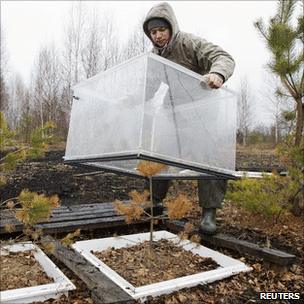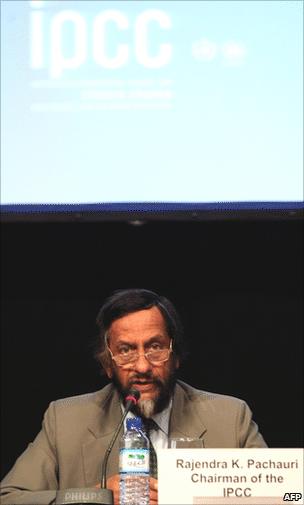Climate panel enters the harsh light of day
- Published
- comments

The panel's procedures for assessing scientific evidence are being refined
For a first post in this exciting new livery, nothing seemed more appropriate than a return to a topic close to many regular commenters' hearts: the Intergovernmental Panel on Climate Change (IPCC), external.
Last October, we flagged up the reform process the organisation was going through as it attempted to meet challenges posed by its various kinds of critic.
Some have been harsh in the extreme, accusing the panel of collusion, corruption and confusion.
More friendly - and, ultimately, more influential - criticism came in a UN-commissioned report from the InterAcademy Council (IAC), external, an umbrella organisation encompassing the world's science academies.
Its report, launched last August, found nothing wrong with the IPCC's fundamental conclusions, external on climate change.
But it did make a number of recommendations aimed at bolstering its procedures and products, in areas such as assessing non-peer reviewed sources, dealing with uncertainties, avoiding conflicts of interest, and making sure spokespeople stay within their briefs.
This week, the process of deciding what to do in response to all these recommendations is supposed to come to a close at a plenary meeting in Abu Dhabi.
On some of the issues, groups of national delegates have done some offline cogitating and have come back with concrete proposals, which presumably will either be adopted or not.
Some, as I've noted previously, seem incredibly trite: does it really need delegates from every IPCC member nation to decide the precise terms of reference of the head of the secretariat?

IPCC chiefs are supposed to be more constrained in their public utterances
Others are clearly more tricky and nuanced.
One aim of the whole process is to emerge as a more transparent organisation, from top to bottom.
Selection of scientific chiefs for various bits of the global climate assessments will be more open to scrutiny.
So will the evaluation of evidence, the peer review process, the processing of comments and the ways of dealing with errors if and when they occur.
Transparency and traceability are the watchwords; at least, that's the theory.
By the week's end we should have agreement on many of these things - and of course it's pretty important to have that soon, given that the process of constructing the next global climate assessment has already begun.
Part of the new transparency is to post all of the relevant proposals and the rationales for them, external on the IPCC website ahead of time - although you could argue things would be more transparent still if the plenary sessions were held in public as well.
Still, some of the documents are well worth perusing.
Guidance for dealing with uncertainties in data, external contains the suggestion - provocative in some circles - that "...in some cases, it may be appropriate to describe findings for which evidence and understanding are overwhelming as statements of fact without using uncertainty qualifiers".
What might be considered to fall into this category (assuming this particular piece of guidance is endorsed)?
Warming of the planet's surface was described as "unequivocal" last time round.
Next time round, will the hand of mankind's greenhouse emissions in driving that warming be formally judged to be certain? Or will the "certain" category be reserved for physical world observations?
For that, we'll have to wait a while longer than the end of this week.
But one thing is clear: the IPCC now has far more pairs of critical eyes trained on it than ever before.
Every judgement it makes, every critical comment, every misplaced semi-colon will be picked up somewhere; there is no hiding place anymore.
That may be a pain for people working with the organisation; but it could help make the global climate assessments better compiled than ever before.